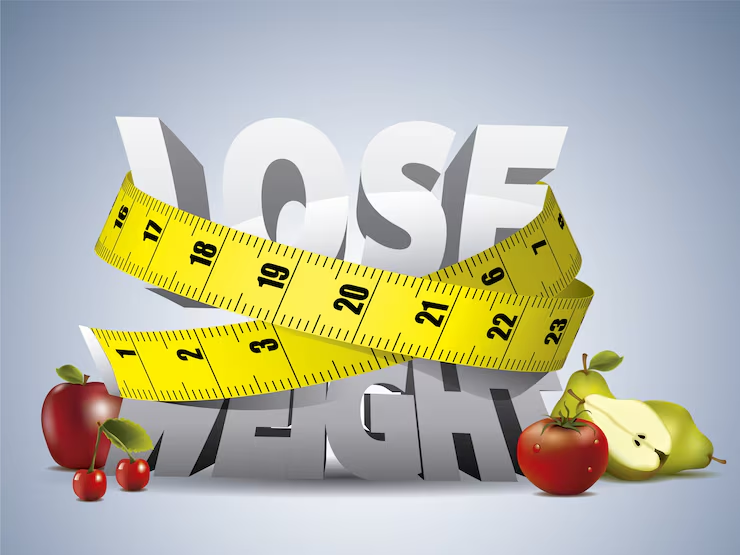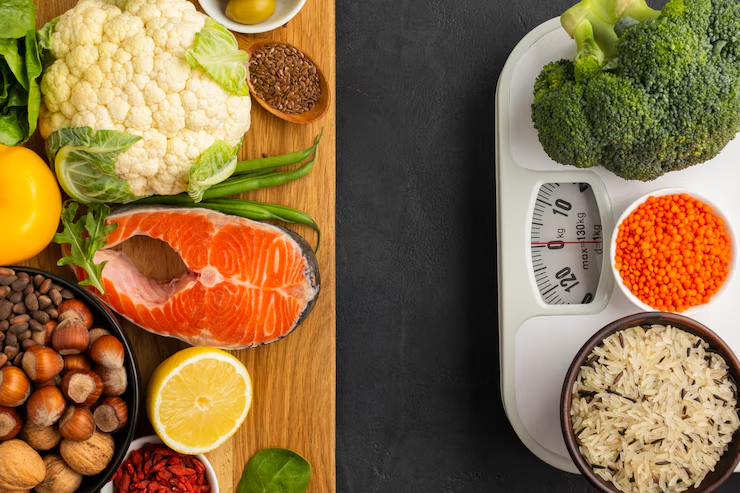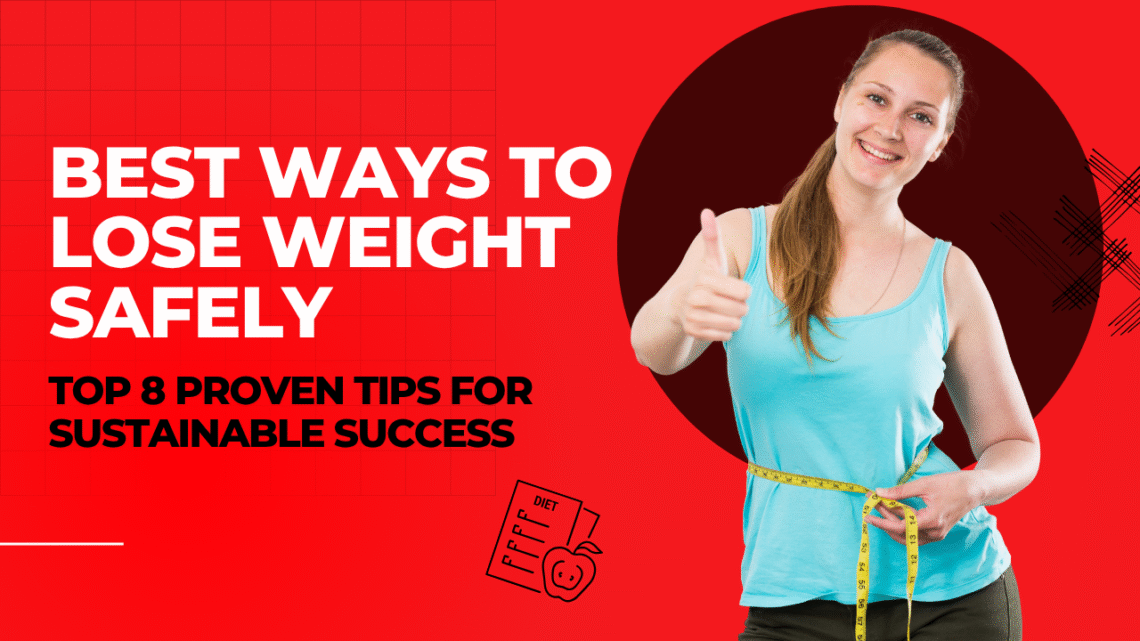In today’s fast-paced world, weight loss is a common goal for many people—but it’s essential to approach it in a safe, healthy, and sustainable way. Extreme dieting and quick fixes can lead to short-term results but long-term harm. Instead, the best ways to lose weight safely involve balanced nutrition, consistent physical activity, and smart lifestyle changes.
If you’re looking to slim down and get healthier, it’s crucial to follow the best ways to lose weight safely. Many people turn to crash diets or extreme workouts, but these methods often do more harm than good. Instead, the key lies in creating a balanced, long-term strategy that supports both your physical and mental well-being.
This comprehensive guide explores everything you need to know about losing weight without compromising your health. Whether you’re beginning your journey or searching for a more sustainable approach, these top 8 tips offer a smart roadmap to safe and effective results. From focusing on whole, nutrient-dense foods to staying consistently active and getting enough sleep, every tip is designed to work with your body—not against it.
You’ll also discover how important it is to avoid fad diets, stay hydrated, track your progress, and most importantly, be kind to yourself along the way. Remember, the best ways to lose weight safely aren’t about quick fixes but about building habits that last a lifetime. Stick with it, stay motivated, and you’ll not only lose weight—you’ll feel stronger, more confident, and healthier every step of the way
Why Safe Weight Loss Matters

One of the best ways to lose weight safely is to steer clear of rapid or extreme weight loss methods. Crash diets, detox teas, starvation plans, and excessive calorie restriction may promise quick results, but they often do more harm than good. These approaches can lead to dehydration, muscle loss, nutrient deficiencies, and a slowed metabolism—making it harder to maintain any weight loss in the long run.
Instead of falling for these dangerous fads, it’s smarter to focus on sustainable, healthy habits. Safe weight loss should be gradual—about 1 to 2 pounds per week—and should come from a combination of balanced nutrition, regular physical activity, and adequate hydration and sleep. Choosing whole foods, managing portions, staying active, and listening to your body’s hunger cues are far more effective in the long term.
By avoiding quick fixes and embracing a steady, mindful approach, you not only support lasting weight loss but also improve your overall health, energy levels, and emotional well-being. The best ways to lose weight safely aren’t flashy—they’re rooted in consistency, patience, and self-care. Your goal should always be health, not just a number on the scale.
The ideal weight loss pace is about 0.5 to 1 kg (1 to 2 pounds) per week, which ensures fat loss while preserving muscle mass and avoiding health risks. Safe weight loss:
- Improves energy and mood
- Reduces the risk of chronic diseases
- Boosts confidence
- Encourages lasting lifestyle changes
Top 8 Tips: Best Ways to Lose Weight Safely
1. Prioritize Whole, Nutrient-Dense Foods
Eating real, whole foods is the foundation of safe weight loss, making it one of the best ways to lose weight safely and sustainably. Whole foods—such as vegetables, fruits, whole grains, lean proteins, nuts, and seeds—are rich in essential nutrients and fiber. They help regulate your appetite, support healthy digestion, and keep you feeling full longer, which naturally reduces the likelihood of overeating.
Unlike processed and refined foods that are loaded with empty calories, sugar, and unhealthy fats, whole foods nourish your body while keeping your metabolism active and balanced. These foods also help maintain steady blood sugar levels, prevent energy crashes, and reduce cravings that often lead to unhealthy snacking.
Incorporating real foods into your daily meals empowers you to make mindful eating choices without relying on extreme diets. Start by preparing home-cooked meals using fresh ingredients, choosing whole grains over white carbs, and adding a variety of colorful vegetables to your plate.
By focusing on quality, not just quantity, you can achieve safe, gradual, and lasting weight loss. Simply put, prioritizing whole foods is one of the best ways to lose weight safely, while also improving your energy, mood, and overall health for the long run..
- Vegetables and fruits (rich in fiber, vitamins, and antioxidants)
- Whole grains (brown rice, oats, quinoa)
- Lean proteins (chicken breast, tofu, legumes, eggs)
- Healthy fats (avocados, olive oil, nuts, seeds)
Whole foods are not only more filling but also provide the nutrients your body needs to function optimally while shedding excess weight. Avoid processed and ultra-refined foods that are high in sugar, salt, and unhealthy fats.
Quick Tip: Read labels and choose foods with short, recognizable ingredient lists.
2. Control Portions Without Starving Yourself
Even healthy food can contribute to weight gain if consumed in excess. Practice mindful portion control by:
- Using smaller plates
- Eating slowly and without distractions
- Recognizing hunger vs. emotional eating
- Avoiding second helpings unless truly hungry
Visual Portion Guide: (Best Ways to Lose Weight Safely)
- Palm = Protein (chicken, fish)
- Fist = Veggies or carbs (broccoli, brown rice)
- Thumb = Healthy fats (olive oil, peanut butter)
Remember: weight loss is about calorie balance, not deprivation.
3. Stay Consistently Active

Physical activity plays a huge role in weight loss and overall health. Regular exercise:
- Burns calories
- Preserves muscle mass
- Boosts metabolism
- Improves mood and reduces stress
Aim for: (Best Ways to Lose Weight Safely)
- 150–300 minutes of moderate exercise/week (walking, cycling, swimming)
- Strength training 2–3 times/week
- Light daily movement (stretching, stairs, housework)
Tip: Find an activity you enjoy to stay motivated—whether it’s dancing, yoga, or hiking.
4. Drink More Water, Ditch Sugary Drinks
Staying well-hydrated is one of the best ways to lose weight safely, yet it’s often underestimated. Water plays a vital role in nearly every function of the body, especially those related to digestion and metabolism. Drinking enough water each day helps your body break down food more efficiently, supports nutrient absorption, and can even boost your metabolic rate—helping you burn more calories at rest.
Additionally, water naturally suppresses appetite. Sometimes, what we perceive as hunger is actually thirst. Drinking a glass of water before meals can help you feel fuller, leading to better portion control and reduced calorie intake. This simple habit can significantly support your weight loss journey.
To reduce empty calorie consumption, replace sugary sodas, fruit juices, and energy drinks with healthier alternatives like plain water, herbal teas, or naturally infused water (add slices of lemon, cucumber, or mint for flavor). These options keep you hydrated without the added sugar or artificial ingredients.
By choosing water over sweetened beverages and drinking consistently throughout the day, you can support your metabolism, control cravings, and stay on track. For those seeking the best ways to lose weight safely, prioritizing hydration is a simple, effective, and essential strategy..
5. Get Enough Sleep
One of the best ways to lose weight safely that many people overlook is getting enough quality sleep. Sleep plays a crucial role in managing hunger and energy balance. When you don’t get enough rest, your body produces more ghrelin (the hunger hormone) and less leptin (the satiety hormone), making you feel hungrier and less satisfied after eating. This imbalance often leads to cravings for high-calorie, sugary foods.
Lack of sleep is also associated with increased stress levels, which can trigger emotional eating or poor food choices. Additionally, when you’re tired, your motivation to exercise drops, and your metabolism slows down—both of which hinder weight loss efforts.
To support healthy weight management, aim for 7–9 hours of uninterrupted sleep each night. Creating a relaxing bedtime routine can help your body wind down. Try limiting screen time before bed, avoiding heavy meals or caffeine in the evening, and keeping your sleep environment dark and quiet.
Quality sleep supports your metabolism, balances hunger hormones, and boosts your energy for physical activity. Incorporating restful sleep into your wellness plan is not only essential for overall health—it’s one of the most overlooked yet best ways to lose weight safely and maintain long-term success.
6. Track Your Progress Mindfully (Best Ways to Lose Weight Safely)
One of the best ways to lose weight safely is by tracking your daily habits. Monitoring your food intake, physical activity, and body changes helps you stay accountable and recognize what’s working—and what isn’t. Rather than relying solely on willpower, tracking brings awareness and structure to your journey.
Start with a simple food diary or a calorie-tracking app like MyFitnessPal. Logging your meals helps you understand portion sizes, calorie intake, and nutritional balance. You’ll begin to spot patterns, like emotional eating triggers or times when you tend to overeat.
Incorporate tools like step counters or fitness trackers to monitor your physical activity. Aim for consistent movement, even if it’s just a brisk daily walk. Weekly weight check-ins can provide insight, but don’t get discouraged by daily fluctuations. Weight can be influenced by water retention, sleep, and other variables.
Most importantly, don’t let the scale define your progress. True transformation comes from how you feel—more energy, improved mood, and clothes fitting better. Tracking these non-scale victories can be far more motivating and accurate indicators of success.
By using simple tools and focusing on consistency, you’ll develop sustainable habits. Tracking is not about perfection—it’s about learning, adjusting, and growing. It’s one of the most powerful and best ways to lose weight safely.
7. Avoid Fad Diets and Detoxes (Best Ways to Lose Weight Safely)

Quick-fix diets may seem tempting, but they’re rarely among the best ways to lose weight safely. These trendy plans often eliminate entire food groups—like carbs or fats—and promise drastic results in just a few days or weeks. While the scale might go down temporarily, the effects are usually short-lived and potentially harmful.
When your body is deprived of essential nutrients, it can lead to fatigue, irritability, digestive issues, and even weakened immunity. Many people on extreme diets experience intense cravings, which may trigger binge eating or a cycle of yo-yo dieting—losing weight quickly, only to gain it back just as fast.
Even more concerning is the impact on your mindset. Restrictive plans can create a damaged relationship with food, making you feel guilty for eating normally or anxious around meals. Over time, this leads to emotional stress and an unhealthy view of your body.
The best ways to lose weight safely focus on balance, not restriction. Instead of cutting out whole food groups, aim to eat a wide variety of nutrient-dense, whole foods in proper portions. Sustainable weight loss comes from nourishing your body, not punishing it. Choose long-term health over quick results, and your body—and mind—will thank you.
Instead, choose a balanced, realistic eating plan that fits your lifestyle. Popular science-backed options include:
- Mediterranean diet
- DASH diet
- Plant-based or flexitarian diets
Tip: If a diet sounds too good to be true—it probably is.
8. Be Kind to Yourself and Stay Consistent
Weight loss is not a straight path—it’s a journey filled with ups, downs, and learning experiences. One of the best ways to lose weight safely is to understand that setbacks are normal and part of the process. You might miss a workout, indulge in a treat, or face a plateau—but these moments don’t define your journey.
Instead of striving for perfection, focus on progress and consistency. Celebrate small victories like making a healthier food choice, walking an extra mile, or drinking more water. These habits add up over time and create lasting change.
Don’t let guilt derail your motivation. Being too hard on yourself often leads to unhealthy patterns like crash dieting or emotional eating. A more effective approach is to treat yourself with kindness, learn from your experiences, and recommit to your goals with a positive mindset.
Remember, the best ways to lose weight safely involve sustainable changes—not extremes. Prioritize balance, nourish your body, and listen to your needs. With patience, resilience, and self-compassion, you’ll build a healthier lifestyle that supports long-term weight management and overall well-being. Let your journey be about growth, not just the number on the scale.
Practice self-care through: (Best Ways to Lose Weight Safely)
- Stress management (meditation, journaling)
- Support groups or health coaches
- Celebrating small wins (like preparing a healthy meal or skipping soda)
The key is to build habits that are sustainable for life, not just a temporary fix.
Sample Safe & Healthy Meal Plan

Breakfast:
Oatmeal with chia seeds, sliced banana, and a drizzle of honey
Green tea or black coffee
Lunch:
Grilled chicken or tofu salad with olive oil vinaigrette
Quinoa or brown rice on the side
Snack:
Greek yogurt with berries or raw nuts
Dinner:
Baked salmon, steamed vegetables, and sweet potato
Water with lemon
Dessert (Optional):
Dark chocolate square or a bowl of fruit
Common Weight Loss Mistakes to Avoid
- Skipping meals (can slow metabolism)
- Over-restricting calories
- Obsessing over the scale
- Falling for “magic pills” or weight loss teas
- Not eating enough protein or fiber
- Ignoring mental health and emotional eating triggers
FAQs: Best Ways to Lose Weight Safely
1. How much weight can I lose per week safely?
A safe rate is 0.5–1 kg (1–2 pounds) per week.
2. Can I lose weight without exercise?
Yes, through diet control, but combining both is more effective.
3. Do I need to count calories?
It’s not mandatory, but tracking helps increase awareness of eating habits.
4. Are carbs bad for weight loss?
No. Complex carbs like oats, brown rice, and quinoa support energy and satiety.
5. What’s the best diet for weight loss?
The best diet is one you can stick to long term—balanced, whole-food based, and enjoyable.
Final Thoughts
The best ways to lose weight safely are built on balance, consistency, and self-awareness—not on drastic diets or unrealistic fitness goals. Sustainable weight loss doesn’t mean cutting out entire food groups or starving yourself. Instead, it’s about creating a lifestyle that supports both your physical and mental well-being.
Start by embracing whole foods like fresh vegetables, fruits, lean proteins, legumes, nuts, seeds, and whole grains. These nutrient-dense options help fuel your body, stabilize blood sugar, and reduce cravings. Avoid heavily processed foods that are high in sugar, sodium, and unhealthy fats, which often contribute to weight gain and low energy.
Portion control is another cornerstone of healthy weight management. You don’t have to count every calorie—but being mindful of how much you eat can make a big difference. Visual cues like a palm-sized portion of protein or a fist-sized serving of carbs can help you gauge meals without feeling restricted.
Incorporate regular physical activity, such as walking, swimming, cycling, or strength training. Exercise not only burns calories but also improves your metabolism, reduces stress, and enhances mood—all important for staying on track.
Equally important is self-care. Chronic stress, poor sleep, and emotional eating can sabotage even the best diet and exercise plans. Prioritize rest, relaxation, and mental health to support long-term success.
The best ways to lose weight safely aren’t about quick fixes—they’re about building habits that you can stick with. By focusing on nourishing foods, balanced portions, consistent movement, and emotional wellness, you can achieve healthy, sustainable weight loss that transforms your life from the inside out.
With consistency and the right mindset, you can not only lose weight—but feel empowered, energized, and in control of your health journey.





